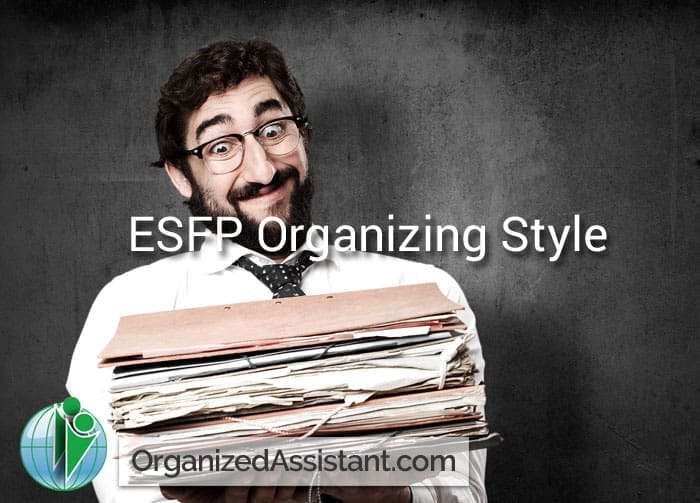ENFJ Organizing Profile
This page may contain links to Amazon.com or other sites from which I may receive commission on purchases you make after clicking on such links. Read my full Disclosure Policy

Today we continue our look at the organizing styles of the 16 personality types, with the ENFJ Organizing Profile.
ENFJ stands for stands for Extraverted – Intuitive – Feeling – Judging. If you’ve missed the previous posts in this series, I encourage you to go back and begin with Learn About Organizing for Personality Types.
ENFJ Organizing Strengths
ENFJs tend to be good time managers and are comfortable living and working in an organized environment.
They finish what they start and have well-organized bookshelves and storage space. They remember meetings, special occasions, and tasks to be done, and have no difficulty making decisions. They don’t waste time rearranging or looking for things, and have no problem finding places to put their possessions.
ENFJ Organizing Challenges
ENFJs get frustrated when something interferes with their plans, so frequent interruptions or schedule changes could be challenging for them. They may also find it difficult to function effectively in an unstructured environment.
Their Feeling preference often causes them to stop what they’re doing when someone wants to talk to them.
They specifically indicate that the following are sometimes a problem for them:
- Forgetting to do tasks that aren’t on their “to do” lists
- Procrastination when they don’t want to do something
- Hoarding things that may be useful “some day” and items with sentimental value.
- Clutter, because they don’t know where to put things
One ENFJ described her situation as follows:
“I am very organized, yet I have clutter in my home and on my desk at work. I think part of this is that I over commit. My N comes up with lots of ideas, and my J thinks I can really get them all done! And my F often feels like there are more important things to do than clear out the clutter, and avoids the conflict I experience between, liking things organized and clutter-free, and wanting to get doing things (like working in the garden or spending time with friends).”
Another shared the following:
“As an ENFJ with very clear Intuition and Feeling, I think I run into trouble with clutter because I don’t want to have to re-create tangibles. My biggest vulnerability with clutter is paper. I have notebooks, folders of information, courses I’ve designed, courses I’ve taken, various iterations of workshop materials, journals and bulletins, drawers of materials from my faith community, drawers and boxes of miscellaneous papers, etc. You get the picture. So I suffer with paper and clutter overload to avoid having to experience not having something I knew I had once and now want again. Strange, isn’t it? Some people can’t part with books. That’s easy. You can always buy or borrow another copy. But who else has your personal notes from a conference you attended?”
ENFJ Time Management Systems
ENFJs use planners and calendars for both work and personal activities. Due to their preference for Intuition, they tend to focus more on the big picture and long term plans than on daily tasks.
Learn More
For more insight into the ENFJ organizing style, read about Organic Structures on Pixies Did It.
For a broader view of the ENFJ personality type, check out the following resources:
Keep in mind that we are all unique, and even people sharing the same type preferences will not be the same in every way. Personality type is only one factor to consider when developing organizing solutions for your clients.
Are you an ENFJ?
Help others understand your personality type and organizing style by answering one or more of the following questions in the Comments:
- What are your organizing strengths?
- What are your organizing challenges or weaknesses?
- What organizing strategies work well for you?
- What are your time management strengths?
- What are your time management challenges or weaknesses?
- What time management strategies work well for you?
- What type of calendar(s) do you use?
Photo © Elnur_ / depositphotos




What is interesting about this one is that they function in a mostly organized fashion, but aren’t always perceived that way. The feeling aspect is very interesting, isn’t it? I can definitely see how the more sentimental people have a greater struggle with letting go of emotional items!
Yes, I find this one fascinating too. I will always remember the woman in my course who had always thought she was a different type (similar to the rest of her family) and how liberated she felt when she discovered her true type was ENFJ.
What a great resource! This definitely helps me understand some of my clients better 🙂
I’m so glad – that’s the goal!
I find it interesting that there various personalities do over lap a little bit. I see myself in different aspects of all of these personalities. It can get confusing to figure out what type I am. Thanks for sharing.
Sabrina, these profiles aren’t intended to help you identify your personality type, but to shed light on the organizing style for each particular type. The best way to discover your type is by completing the MBTI with a trained practitioner, but you can get a rough idea by doing the Jung Typology Test on the Humanmetrics website.
I’ve been anticipating this post, Janet, for ENFJ…That’s me! Some of what’s written resonates with me and some not as much. I’m a good time manager and am comfortable in organized spaces. But I also function in cluttered environments, which is often the case when working in my clients’ spaces. The part that doesn’t quite click with the description is that I am organized and others perceive me that way. As far as being frustrated when plans are interrupted, I identify with that. I work at being flexible because as we know, life doesn’t always go as planned. I rely heavily on my “to do” list. And especially as I age, if it’s not on the list, I can’t trust everything to memory. Clutter and procrastination aren’t generally an issue for me. I am a collector and have sentimental attachments to some things, but generally don’t keep more than I need or want. I recognize that there’s always room for letting go.
Thanks for weighing in, Linda – your input is valuable!